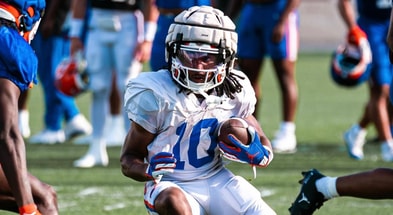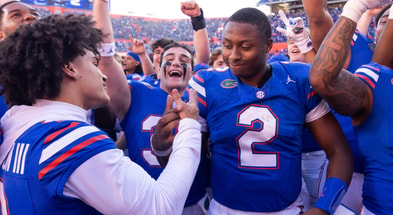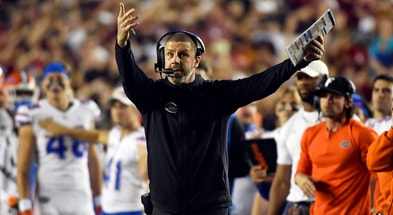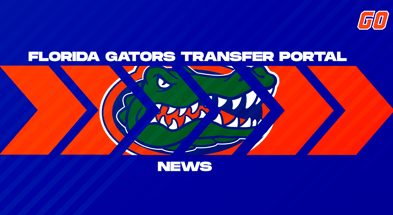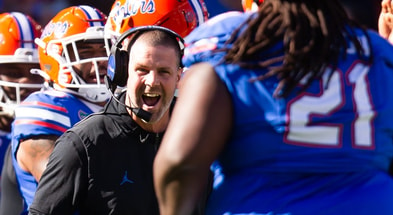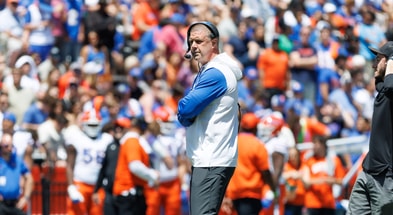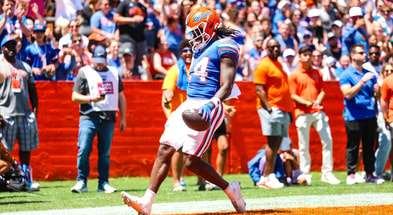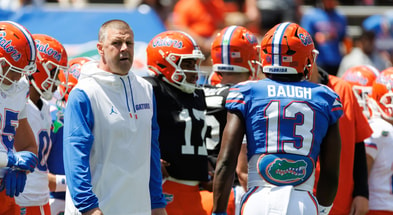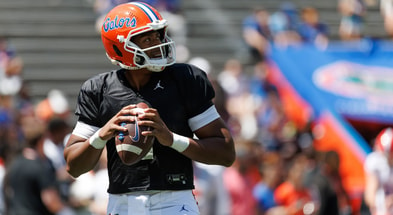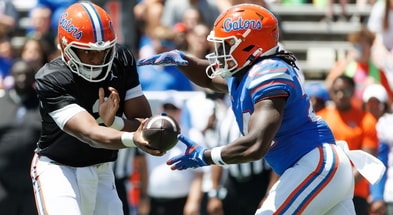Billy Napier addresses play calling and recruiting class on National Signing Day

GAINESVILLE, Fla. — Florida Gators head coach Billy Napier met with the media on National Signing Day. Napier fielded a wide range of questions about the Gators, who will start spring practice on March 7.
Everything Billy Napier said on National Signing Day
Opening statement:
“It’s good to be back. We have quite a few things to talk about and I know [the media] has quite a few questions here. I do think we’ve added some really good players to our team since the last time we were in front of [the media] and certainly a lot of staff changes and new hires to discuss here. Good group. Nobody to report in terms of signing today but I know you all have questions about a couple high school players and a handful of transfers. Off to a good start. Almost close to being done with phase one and staff will be off Thursday, Friday, Saturday, Sunday and we’ll kind of turn the page to phase two on Monday. A lot of questions here so let’s get straight to it.”
On how much money it will take in NIL to compete at the SEC level:
“I think, I feel, if I could — the amount of time and effort and energy that’s been put into creating the system that we have in place now, I think probably took us about 18 months to get a pulse on the landscape and what it would require to be competitive but, more importantly, what our approach is going to be relative to who we want to be, the caliber of player that we need to compete and more importantly the type of people that you want to attract to your program. I think to some degree the way we’ve structured this thing, we’re built to be sustainable, repeatable. Can’t compliment Florida Victorious enough for the leadership and then the collaboration. There have been a lot of people who have invested a ton of time and resources so we have great resources here and that’s no secret. We have an incredible alumni network and we continue to produce quality alumni. This place has never been hurting for resources. I think, more importantly, it’s the strategy behind it and how it’s constructed and what you’re using NIL for. I think I’m proud of the service-oriented work that we do and I’m proud of the financial literacy piece that’s required as a result of the NIL opportunities that our players have. Really, all 21 sports at the University of Florida, I think we have a vehicle to execute in that space that’s going to benefit all sports, not just football.”
On how much money it will take in NIL to compete at the SEC level:
“I think that each individual situation, I think it’s very fluid and I would say much like the market, there might have been something yesterday and then it’s changed today to some degree. I think each cycle, the market changes, if that makes sense. I think we’ve seen an evolution. We’re talking about drastic change every six months since I’ve been the coach here, if that makes sense. It took us a little bit of time there to get in position but I don’t know that there’s a number. I think that number grows every six months.”
On defensive staff changes. What was the tipping point there?
“I think part of the evaluation was just that we need to play better on that side of the ball. We go through a process to evaluate what we need to do better. Sometimes that’s new leadership, a new voice, a new teacher, a different approach in recruiting, whatever the case may be. And I think we were able to answer some of those things. And then Jay got a chance to be a coordinator again, so we went and we were able to get one of the better defensive coaches in the country back and back on our staff. I think we’ve done well; so far, so good. We went through a very extensive process to land where we landed with Will Harris and Gerald Chapman, both of which I think have proven to be what we thought they were — really good teachers. I think they’ve got character. I do think they have a passion for people, they care for the player independent of the game. Great families and pedigree. They’ve been around good coaching; they know what it looks like. They’ve coached at the highest level and coached at the Power Five level. I think they’ve done a good job connected with the staff and the players so far.”
Austin and Ron have a relationship from the past. How’s that collaboration going to work?
“It’s phenomenal. You think about Ron Roberts and what he brings to the table: veteran coach, been a head coach, been a coordinator and a play-caller. Austin and him, there’s a mentor-type relationship there. And a ton of respect, mutual respect on both sides, so I think we get the wisdom. This system, there’s a number of coaches. You guys obviously will write the story at some point. But this guy’s mentored a million defensive coaches in his career, some of which are coordinator/play-callers in the NFL and college football. So I think it’s a positive because I think the system that we run, Ron started that system at Louisiana. The first two years we were there, kind of got it up and running. It’s evolved and the guys that have been running it worked for him in the past. So I think whether that was Patrick Toney, who took over who’s now at the National Football League, or Austin, Jay Bateman’s in that tree of coaches. They call him the OG, the Godfather, whatever you want to call him. We get him back in the building and he’s going to make us better and he’ll make the players better. His guys have always been productive, the guys that he coaches and the units that he coaches. So there’s a track record of really good defense and we’re fortunate to have him.”
On the executive defensive head coach title, specific new duties with that you can elaborate on:
“Yeah, head coach of the defense. You know, basically, a guy who oversees that side of the ball to some degree. Austin obviously is the coordinator, calls the plays and runs the unit meetings, but we’re getting a guy who can coach the coaches, who can improve the installation, the gameplans, really get the best on that side of the ball essentially. He’s the head coach of the defense to some degree, so, and I think the coordinator-relationship there is one that’s, you know, those guys are, they’re loving life right now, so they’re both ball guys, and let me say, we’ve got Mike Peterson in that room, Will Harris in that room, Gerald Chatman in that room, you know, we’ve promoted Kali James, he’s a graduate assistant, he’s kind of the assistant defensive line coach and is going to help us with the hybrid players. It’s a good room, and I think they’re in a good place, they’re excited to work together.”
On Mark Robinson’s role, if that’s the landscape now of having a guy who can take something off the head coach’s plate:
“Yeah there’s no question, I mean, I think there’s an execution component to not only the recruitment process, but there’s also kind of a, there’s a new variable, you know, I don’t know if you want to use the salary cap, you could use it, you know, but to some degree there’s a ton of agent relations, parent relations, current roster relations, not to mention the acquisition of talent and the big picture, relative to how you put that whole puzzle together. It’s not only 85 scholarship players, it’s 50 walk-ons, it’s how many midyear slots do you have, what strategy do you take with each position, high school players, portal players, so, he’s got experience I think in the operations area, but he also was a part that collective operation at Texas A&M. So he’ll work closely with the administration there in terms of making sure we’re connecting the dots and making sure we’re going about things the right way.”
On the offensive play-calling, potential changes, what tweaks have been made already:
“Yeah, you know, we’re in the process of defining those roles is what I would say, and I think we’re working our way through that. I do think that we will, there’ll be different responsibilities to some degree, you know, I think you’ll see, we’ll probably talk more specific about that in the future, but I do think, much like we made a hire in the NIL space, the chief of staff, front-office space with Mark Robinson, we made a hire in special teams, which I assume you’re going to ask. Really an effort to put the right things in place, so that you know the time is allocated for me in the right places, you know, I think it’s been a heckuva two years in terms of all the new things that come with the job. So offensively, I think that we will, we may have different titles and responsibilities within that group of people. There could be an addition or two, we’ve shuffled the deck a little bit in terms of those things, but ultimately we’ll keep the same system and keep moving forward in that regard.”
Foresee any major changes offensively?
“I think, yeah, ultimately, we’re not — again, all that is to be determined is what I would say. You know, I think we’ve got time to figure those things out. But I mean, I don’t see any major overhauls outside of just how we organize that group and now we operate in house.”
How could Russ Callaway help in that area?
“Well, I’ve worked closely with him for a year. I think ultimately, he’s a guy that obviously is going to acquire more responsibility. How we define that, you know, I think we’ll work our way through that. Ultimately, Russ is a heck of a young coach. And much like me, he’s worked on defense in the past as a young coach, he’s called plays at different levels, played quarterback, has the leadership components, has the respect of the players. So, Russ is a guy that we certainly are excited about. And you know, he definitely in the future will require more responsibility.”
Relieved in some regard to take some responsibilities off your plate?
“Yeah, I think the way I would describe it more is like, you wake up and the systems are built. You don’t necessarily feel like, man, we got a lot of work to do to create some type of process here to be competitive in that space. I think the landscape relative to NIL has consistently changed, and I think were finally to a place where like, ‘Okay, we have our method, we have our process, our system. We can execute, we can be competitive.’ I think there’s a little bit more clarity out there in terms of what the opponent is doing and how they operate. And we feel great about our product and what we have to offer. Now, I do think the portal is another, you know, I think it’s hard to acquire players in the portal without the other, to some degree. I think most coaches would tell you that. So early on, you may have wanted to make a lot of moves in the portal, but you know, maybe you don’t have the resources to do that. So, I think we’ve evolved. We were able to recruit the elite player that everybody in the country wants, we’re also able to play Moneyball a little bit, evaluate, find players with traits. And I think, you know, I would say this is probably the best group of players that we’ve had since we’ve been here. So yeah, overall, I think those are the things that I think about. Those are things that I look back, looking at my notes from the previous two years, and I’m thinking about, we’ve done quite a bit of work to this place.”
29 transfers acquired since you got here, 14-15 players who started elsewhere here for this fall. Are you changing your recruiting philosophy based on how the portal is evolving?
“Well, I think we’re doing what we need to do to field the next team, to some degree. I think this is much like the old junior college model to some degree where, “Okay, hey, here’s the roster that we have, here are the issues on the team, here are the depth issues here, here’s where we need immediate impact.’ And we tried to go get those things answered. I think there’s a number of examples of that. Whether it’s, you know, when we first got here, we needed a running back, right? So Montrell Johnson came. We knew we needed offensive lineman, O’Cyrus Torrance. We needed a receiver, Ricky Pearsall. We needed a quarterback, Graham Mertz. You know, there’s some success stories there. There’s others that I think are to be determined on our team, you know? So I think it’s just, it’s one team at a time, to some degree. But I do think from a sustainability standpoint, and just from a market value, overall big picture, I think you’ve got to draft your team, recruit your team, and then you answer questions with free agency. And that’s one cycle at a time, right? So you spend the recruiting cycle recruiting high school players, you get to the end, you know, the fluidity of your roster right before the portal, there’s attrition and then you got to fill those spots. So, I think that it’s much more complicated than it’s ever been. But I think that’s one of the reasons why we staff this thing out the way we have. We’ve also made some changes in the personnel department. Jacob LaFrance is going to kind of take a leadership role and be the general manager, and then Nick McDonald’s the DPP, Joe Hamilton is going to be the director of scouting and recruiting relations and handle the NFL side. We’ve created an underclassmen group, and I think you’re consistently recruiting two classes. We’ve also allocated some people towards the walk-on program as we continue to try to build that. So, from a walk-on perspective, I do think we are making progress. I think we’ve got 116 kids right now, that’s the most we’ve had since we’ve been here at the mid-semester. So, we’re getting good players, we’re retaining them, we need to continue to do that.”
On the injury status and availability of Graham Mertz, Shemar James, Cam Carroll, Justus Boone for spring camp
“Graham will definitely be ready to go. I think some of those others that you mentioned are to be determined. We’ll keep you updated but Graham will be ready.”
On the spring transfer portal window and assessing needs on the roster
“I’ll tell you what I tell our administration and our investors. We plan as if we’re going to need a player at every single position. From a personnel department standpoint that’s the approach we take in the fall and the spring. No matter if we’re deep at a position or not, we’re always going to anticipate because it can happen to you in a hurry. I think we’re always anticipating that we’re going to need a player at each position on the team.”
On the contract/job status of Mike Peterson, Jabbar Juluke, Rob Sale, and Darnell Stapleton
“Yeah, absolutely. We’re in the process of that right as we speak here.”
Jaden Rashada situation and inevitability due to NIL’s lack of guidelines?
“You guys know we can’t speak specifically. I think we’ve made a statement there – we’ll refer to that. I think college football right now is in a very unique space and has been … there’s probably a lot more sanity as we speak to maybe 18 months ago. I think we at least kind of understand what’s required. But we need change; I think everybody knows that. It’s great to see some of our leadership – you saw the SEC and the Big Ten kind of collaborate and create the group. I told staff yesterday, at the staff meeting at 745, when I’m riding to work every morning I think the big thing for me is I would like to get back to the game’s about the players, it’s about the team. I think so much of this consumes your time and some of the things that are good about our game, I’m just hopeful we don’t lose those things. I think the game can teach you a lot about life. There’s a lot of intangibles and values we get to teach. I think the game has become a little bit more transactional – used to be a little more transformational. I think there’s an element to our game that I’m hopeful we get to keep. We get to control how we operate at the University of Florida, in house. I’m excited about working with this team, if that makes sense. This team has done a great job. Obviously we’re right in the middle of the new offseason program we’re in with Coach Fitz, who I assume you’re going to ask at some point about. So that’s what I would say. I’m hopeful we can at some point kinda create some guidelines and parameters and kind of move forward and get back to coaching ball.”
Top 10
- 1New
Lee Corso
Sends message to fans
- 2
Johntay Cook
Sets visit, schools show interest
- 3Hot
Kryen Lacy agent
Calls out sheriff, NFL after death
- 4Trending
Rylan Griffen
Back to SEC?
- 5
Urban Meyer
Crushes state of NIL
Get the On3 Top 10 to your inbox every morning
By clicking "Subscribe to Newsletter", I agree to On3's Privacy Notice, Terms, and use of my personal information described therein.
Were you surprised the NCAA came to town when you said you didn’t expect it?
“I think that all those things will be addressed going forward. We can’t get specific.”
Why did you hire Craig Fitzgerald, and what have you seen since he started?
“We’re fortunate to have the guy. He’s obviously very knowledgeable, he’s got great experience, he’s coached in the National Football League for eight of the last 10 years. He’s revived programs: South Carolina, Tennessee, Penn State. Well-regarded in the space. I think Coach Spurrier, obviously his experience with Fitz in the past, there’s a common connection there, not to mention his time with the New York Giants, Tennessee, where we had Bill O’Brien with Penn State. There’s a number of kind of common connections here. And his desire to be at the University of Florida. What I was intrigued with, was he was excited about being back at the collegiate level and the connection piece, the opportunity for him to actually be involved in the development of a college player and the gratification he gets from that. We got great reviews so far from the players. I think, ultimately, it’s about them having belief in what you’re doing. He’s exceptional. We’ve hired Tevin Geddis, Jake Sankel. Jake Sankel, in my opinion, is really unique in his role. He’s not only the director of nutrition, but he’s also one of the assistant strength coaches. There’s an expertise there that I think has been good for our team. His leadership and experience – I mean, he’s been eight years with the Commanders, really running that whole operation – so he’s bringing a lot to our systems in terms of how we operation in that space as well. We’ve got two experts. I’m a firm believer that’s where the game is headed. I think it’s all about the development piece in terms of the player experience and what we can offer the player. We tried to really invest in that area. And then again, it’s about developing the best player experience in the country. I think we’ve got a unique degree to offer. We’ve got an incredible alumni network. We have invested in player development with GatorMade. We’ve got the development piece with coaching and then certainly the strength and conditioning, sports science, and nutrition piece. Those two are doing a great job.”
What about the hire of senior special teams analyst Joe Houston?
“I think Joe Houston is an outstanding coach. I think we’re not only acquiring an expert in the special-teams space, but we’re getting a guy who has four years of Coach Belichick and that organization. All those meetings and all those things observed, and things that he brings to our staff. I do think we did well statistically in some areas, but there was no doubt there were some organizational things that could have been done better. I think we added a layer of expertise and another set of eyes, another set of hands there in ultimately a big picture viewpoint. The situational football piece, too, will be put under that umbrella as well with he and Chris working together, so it’s good for the Gators, I hired Joe Houston for one day at Louisiana and then Bill hired him. We’re fortunate to get him back.
Mark Hocke’s role?
“So Mark’s going to be in the player development space. A lot of our leadership development and character education – a lot of the things that we do relative to learning and teaching, we do a number of tests with the rookies when they arrive, take in all that data and all those assessments in helping the coaches in that space. Also helping me from a messaging standpoint. Motivation, themes throughout the offseason, throughout the season. Things that he’s really talented at. He’s also going to sit in on offensive and defensive meetings and be a part of the evaluation and recruitment process. It’ll help him as he continues to evolve.”
Director of motivation?
“No, player development.”
No. 4 nationally in returning production? How critical is this offseason to leverage that?
“Yeah, I think ultimately the goal for a long time has been to build a veteran team. I think ultimately the playoff kind of proves that, to some degree. I think the two teams that played for it had really strong cultures, and I think they also had veteran teams, right? So it’s a process to get to where we want to go. We’re right in the middle of that. Part of that is building an experienced roster — continuity in system, experienced roster, the height, length and speed to win the matchups. Ultimately I think we’ve got to continue to get better here. We’ve got to grow up, and there’s got to be some maturity. This offseason will be a part of that. But we’re going to start in a much better place. All these guys that played – first-time starters, freshmen, sophomores last year —they start this offseason with a ton of experience and wisdom. I think that leadership component, too, with the talented group of rookies coming in, I think that’s good for the Gators.”
Special teams – coordinated by one guy during games? Or collective effort?
“Yeah, no, I think it’s much like we’ve talked before. Majority of that work is done during the week, and I think each year it’s a little bit different, is what I would say. We’re a long way from playing a game. A lot of work to be done between now and then.”
On the new additions to the DB class:
“I think some of the new players would be good to talk about it. DJ Douglas is a player that we’re excited about, the safety from Tulane. He’s impressed so far. He’s got a temperament about him. He’s a leader, He’s a good communicator. Think there’s some continuity in the system he played in and he’s an alpha and he’s a worker. His work ethic has impressed so far. He’s 6-foot, 205, came from Thompson High School in Alabama, which is a really good football program. And then certainly playing at Tulane for Coach Fritz, there’s a ton of respect there in terms of the type of program that they run. So I had a couple of my former players that were on that team that knew DJ and they spoke highly of his behalf. Grimsley, we all know is 6-foot-2 and change. He’s like 190 pounds. He’s a two way player, a guy that played receiver as well. But big, long corner, heavy handed, balls skills, was a little bit banged up as a senior but I think we feel really good about the skill set there. Certainly keeping a player from the state of Florida at home. And Jameer is a Gator. He grew up dreaming of playing for the Gators and we were able to get that done. Asa Turner, 26 starts, 6-foot-2 and change. I think he’s 208, productive, good tackler, leader on the team. Had a voice. I think we really went for high character, leadership traits, production in the portal. That was kind of the theme of the year. Like OK, if we’re going to add players at this point in their career, they need to really be team oriented and high character, bring some things to the team other than just the production on the field. So, I think we’ve learned that a little bit over time. I think it’s so far so good in that regard.”
Go through rest of D-Line guys and edge players?
“I think the new players George Gumbs, Gumbs is 6-4, he weighs like 242, unique story right started as a walk on, Chicago, Simeon HS, started as a walk on receiver, moved to tight end and then last year made the move to pass rusher, and then kind of took off and had a great year, so we’re getting a two-year player that’s got some traits there, maybe could help us on third down, and I think his best football in terms of being a defensive football player is in front of him so, good there, to get Pup Howard back, I think with Pup we were really close, like one phone call away, in the beginning. I think Pup, Pup walking around here at 6-foot-4, 240 inside backer, you know and just the intelligence, that he brings, the character, the work ethic, I mean the guy is wired right, he’s what you want, so, we need more of that, we’ve got to keep the good players in our state at home and it’s a good win for us to get him back.”
D’Antre Robinson?
“D’Antre is the same way grew up a Gator kind of a unique dynamic with the defensive line coach felt like we were really close the first time, and then able to get him back, 6-3, 315 pounds, lean, twitchy, could play on all three downs. I think he’s got good things in front of him and a lot of work to do.”
Recruitment of Clay Millen, getting another QB?
“It was a big piece especially for the future and spring practice and development of our team but we’re getting a guy who started the whole year, a ton of production, got injured last year. Dad playing the National Football League and just a confident player, and a guy that spins it really well, understands football, can communicate, really did a nice job of articulating what his offense was doing and he’s moved the team quite a bit in his career. I’m excited to watch him. I think he will continue to get bigger, stronger, too, as he goes.”
How much does recruitment of Grimsley, Pup, speak to importance of recruiting never stopping?
“No I mean I think it’s what you try to do is you just try to do a really good job of trying to connect with the kid, with the family. We got a great product to sell and I think if we can consistently, the more time we get them on campus the better, it’s hard to beat this place and the experience these guys can have. I think we need to go get some traction on the field and I think we will be tough to stop. I do think it speaks to the job our people do, we’ve got fantastic people and our staff does a great job connecting with people, selling our product. This is a place where you can have success as a person, as a student and as a football player, we’re going to teach a set of values, we’re going to prioritize education, and we’re going to teach and develop football at the highest level, so these guys were, they passed the evaluation in the beginning and we finished second and we go back and get them, I think it’s a good thing and I’m hopeful that trend continues.”




